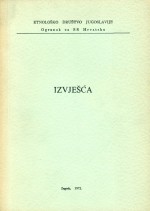Zadruga u Mađara (prikaz objavljenih podataka)
Extended Hungarian Peasant Families. An outline of the published surveys
Author(s): Matilda CrnkovićSubject(s): Customs / Folklore, Cultural Anthropology / Ethnology, Culture and social structure , Rural and urban sociology, Social Norms / Social Control
Published by: Hrvatsko etnološko društvo
Keywords: zadruga; extended peasant family; Hungary; tradition; customs; family relations;
Summary/Abstract: So far the traditional Hungarian family life, especially the life of extended families, has hardly been studied, although there are some individual descriptions of it from various regions. In the frameworks of four studies, concerning four separate villages, the author, Mrs. Edit Fel, has recently published her surveys of kin and family relations, as well as of social life in general, these surveys are the results of the author’s research, they belong neither to the comparative, nor the synthetic type; although Edit Fel wanted to carry out either treatment, she was without sufficient information from Hungarian territory. In one of her works she tried to explicate extended Hungarian family as the Hungarian - Finnish heritage, which Hungarians were able to preserve in new surroundings, which was easier because Indo-European rations had similar traditions. However, Edit Fel insists on the research to be carried in extended family life in Hungary and the comparison of the obtained information with the data about the extended families in the neighboring countries. The descriptions of extended family life and of individual extended families, quite rare nowadays, which Edit Fel has studied, are from villages Martos, Kocs and Marcelhaza in the Komarom county and from the village Atany in the county of Heves. The general characteristics of these families are that sons divide mostly immediately after their parents death, or when their children grow up. One of the brothers, as a rule the youngest one, remains in the parents house. The authority of the father in a family is considerable. The rights of elder brothers or sisters in comparison with the younger ones are remarkable. The arrival of a son-in-law into his wife’s parents house is a regular and frequent occurrence, which helps solve numerous problems of the right of succession. As long as extended family members live together, their organization of common life is firm, they cooperate in their work and distribute it, live in the same house and "share the same bread". These and many other data, which the author Edit Fel has brought to light, show basically common characteristics and, perhaps, rather important differences in particulars. They can be a contribution, if not even more, in unriddling some problems concerning South - Slavic zadrugas.
Journal: Etnološka tribina : Godišnjak Hrvatskog etnološkog društva
- Issue Year: 1972
- Issue No: 3
- Page Range: 81-93
- Page Count: 13
- Language: Croatian

